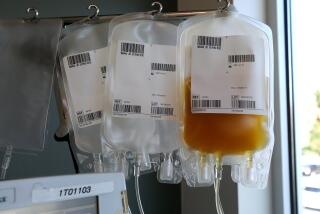New Amgen Blood Drug Performs Well in Trials
- Share via
THOUSAND OAKS — In the high-stakes race to bring to market a drug that stops the internal bleeding suffered by chemotherapy patients, Amgen Inc. received a major boost Thursday from the publication of a study in the New England Journal of Medicine.
The journal reported that MGDF, a genetically engineered hormone created by Amgen, showed positive results in 70% of lung cancer patients tested in a small, early study.
Although the drug will have to undergo at least a couple more years of testing in order to get through the Food and Drug Administration approval process, this was hopeful news, primarily for cancer patients and their doctors.
“In oncology, it’s very common for a patient to have a low [blood] platelet count because of chemotherapy,” said John Glaspy, a Northridge doctor who headed the research team that tested the drug at UCLA School of Medicine.
“And a patient with a low platelet count can actually bleed to death,” he said, due to the inability of the blood to clot.
Currently, chemotherapy patients receive blood transfusions to bolster the numbers of their platelets--blood cells that have the job of plugging up a wound at the start of the healing process. But transfusions present contamination risks from blood-borne diseases and are effective for only a limited amount of time. Also, they’re costly.
MGDF and a similar drug, TPO, developed by Genentech of South San Francisco--were developed to artificially stimulate platelet growth when the body can’t. Hopeful data on both has been revealed previously at medical conferences. But the publication of the journal article on MGDF marked the first time that clinical trial data on the drugs has passed the scrutiny of peer review.
“It’s a very important step in acceptance of any data,” said Glaspy, who co-authored the report. “Before that, it was just preliminary results that we had. Nobody believes in something, in the scientific sense, until after a peer review.”
Glaspy cautioned that larger and more in-depth studies need to be done before MGDF is proven safe and effective enough to be submitted for federal approval. But if all goes smoothly, he said, MGDF could be on the market within two years.
*
The rewards for the first company to get approval and a patent for a platelet-growth drug will likely be vast. In published reports, analysts have estimated that the market for such a drug could be as much as $1 billion a year.
Platelets are the last of the three major type of blood cells to resist the genetic-engineering process. Biotech drugs are already in wide use for red and white blood cells.
The search for a platelet-growth drug began with the search for the hormone that does the work naturally in the body.
It was identified in the mid-1990s as thrombopoietin.
“The next step,” Glaspy said, “was to work back and find the gene that produced it.”
Amgen and Genentech did just that. Through a process that involves taking the gene and exposing it to bacteria to make a human protein, the synthetic hormones were born.
The question of which drug was created first, and how much they resemble each other, will be crucial in determining whether both or only one will be granted a patent. The questions might well end up being settled in court.
“Court battles are frankly part of this business,” said Amgen spokesman David Kaye. “We are very accustomed to them. Everyone is racing to develop a specific drug, and what you are able to patent is the molecular structure of what you develop.”
The clinical trials described in the journal article on MGDF involved 53 patients and were aimed at establishing dosage levels and testing the safety of the drug, Glaspy said. The next study will test Amgen’s belief that MGDF will indeed work in patients whose platelet count has fallen dangerously low.
Although Amgen made it first into a major journal, Genentech executives said they are continuing their own clinical trials and are far from conceding victory.
*
“I think it’s really early,” said Genentech spokeswoman Kathlene Rinehart. “We are moving forward in our development and we will allow the scientific community to judge the results as we move forward.”
She declined to speculate on when Genentech would be submitting an article for scientific journal review.
In the meantime, there is a third drug in the picture. Numega, developed by Genetics Institute of Cambridge, Mass., also spurs platelet growth, although it was derived from a different gene.
Glaspy said he does not consider Numega, which has already been through the clinical trial phase, in the same league as MGDF when it comes to platelet-growth stimulation.
But Genetics Institute Vice President John Ryan said his company is confident. “So far, Numega is the only one of the drugs being developed that is shown to be effective in patients with a severe low platelet count,” Ryan said.
“We have filed for our license from the FDA. It could hit the market by the end of the year.”







